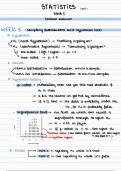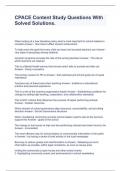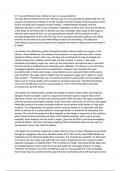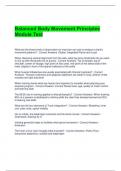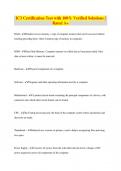Name of the Teacher Date Level of the class Length of lesson
Debbie van der Merwe 14 January 2023 Upper-intermediate 60 Minutes
Lesson Type:
Four Skills: Reading
Lesson Topic:
History of French Cuisine
Lesson Aims: Lesson Outcomes:
By the end of the lesson, students will be better able to… By the end of the lesson, students will have…
… better understand a piece of written text and target vocabulary Read the text and understand the topic of the history of French
by looking for specific information and gist. Cuisine.
Read the text so they can identify specific information in the
reading piece.
Read the text and understand the target vocabulary.
Anticipated difficulties: Suggested solutions:
1. There might be a difficult with words for the students to 1. I will allow students enough time to read the text. This will
identify in the text. allow them the opportunity to better understand the text.
2. All students speak the same L1, so it might be easier to 2. With the introduction to the lesson, I will already make it
speak in their own language at first and not the English clear that we are having a English reading lesson and get
language. the students excited about it.
3. These are French students, so pronunciation might be 3. I will repeat the words a few times and get students to then
1 Lesson Plan
, difficult to some students. repeat these words after me. Drilling will come in very
handy here, and I can also refer to the phonetic chart if
needed.
Authentic Text (insert reading text here or link to the listening recording)
French gastronomy throughout the centuries
French food and cooking are generally considered the backbone of many cuisines across the Western world. A beloved tradition, the French Gastronomic meal is classified as
a UNESCO intangible cultural heritage of humanity. Let’s go back in time and see its diverse journey…
Our ancestors the Gauls
The history of French gastronomy goes back centuries to the Gauls, who developed a culture of eating and drinking well, an art de vivre that still exists today.
The art of feasting in the Middle Ages
Banquets helped affi rm your rank, wealth and level of prestige, and were held to celebrate weddings, engagements, births and victories... Meals were composed of several
courses and enlivened with animations and performances. Forks and knives had yet to make their appearance, so fingers were used to serve from the main dish.
The growth and grandeur of French cuisine
The notion of French cuisine became important during the reign of Louis XIV. Meals became theatrical, orchestrated by a maître d'hotel, and service à la française reached its
peak in the 18th century. Known internationally today, this type of service helps structure a meal, which begins with soups and starters, followed by roasts, ending with
entremets and desserts.
Restaurants become fashionable
Table service in restaurants began during the French Revolution. At that time there were 100 restaurants, which grew to 600 under the Empire and 3000 during the
Restoration period.
From science to culinary arts
In the 18th century, chefs wished to bring out the best and most refined of their creations by combining or breaking down products for maximum taste harmony. At the
beginning of the 20th century, chef, restaurateur and culinary writer Auguste Escoffi er innovated in his own way, creating a simpler, more natural presentation for meals.
French chefs became known overseas in the sixties, building a reputation as the best of their time. Paul Bocuse, honoured as Chef of the Century, launched the
2 Lesson Plan
Debbie van der Merwe 14 January 2023 Upper-intermediate 60 Minutes
Lesson Type:
Four Skills: Reading
Lesson Topic:
History of French Cuisine
Lesson Aims: Lesson Outcomes:
By the end of the lesson, students will be better able to… By the end of the lesson, students will have…
… better understand a piece of written text and target vocabulary Read the text and understand the topic of the history of French
by looking for specific information and gist. Cuisine.
Read the text so they can identify specific information in the
reading piece.
Read the text and understand the target vocabulary.
Anticipated difficulties: Suggested solutions:
1. There might be a difficult with words for the students to 1. I will allow students enough time to read the text. This will
identify in the text. allow them the opportunity to better understand the text.
2. All students speak the same L1, so it might be easier to 2. With the introduction to the lesson, I will already make it
speak in their own language at first and not the English clear that we are having a English reading lesson and get
language. the students excited about it.
3. These are French students, so pronunciation might be 3. I will repeat the words a few times and get students to then
1 Lesson Plan
, difficult to some students. repeat these words after me. Drilling will come in very
handy here, and I can also refer to the phonetic chart if
needed.
Authentic Text (insert reading text here or link to the listening recording)
French gastronomy throughout the centuries
French food and cooking are generally considered the backbone of many cuisines across the Western world. A beloved tradition, the French Gastronomic meal is classified as
a UNESCO intangible cultural heritage of humanity. Let’s go back in time and see its diverse journey…
Our ancestors the Gauls
The history of French gastronomy goes back centuries to the Gauls, who developed a culture of eating and drinking well, an art de vivre that still exists today.
The art of feasting in the Middle Ages
Banquets helped affi rm your rank, wealth and level of prestige, and were held to celebrate weddings, engagements, births and victories... Meals were composed of several
courses and enlivened with animations and performances. Forks and knives had yet to make their appearance, so fingers were used to serve from the main dish.
The growth and grandeur of French cuisine
The notion of French cuisine became important during the reign of Louis XIV. Meals became theatrical, orchestrated by a maître d'hotel, and service à la française reached its
peak in the 18th century. Known internationally today, this type of service helps structure a meal, which begins with soups and starters, followed by roasts, ending with
entremets and desserts.
Restaurants become fashionable
Table service in restaurants began during the French Revolution. At that time there were 100 restaurants, which grew to 600 under the Empire and 3000 during the
Restoration period.
From science to culinary arts
In the 18th century, chefs wished to bring out the best and most refined of their creations by combining or breaking down products for maximum taste harmony. At the
beginning of the 20th century, chef, restaurateur and culinary writer Auguste Escoffi er innovated in his own way, creating a simpler, more natural presentation for meals.
French chefs became known overseas in the sixties, building a reputation as the best of their time. Paul Bocuse, honoured as Chef of the Century, launched the
2 Lesson Plan




